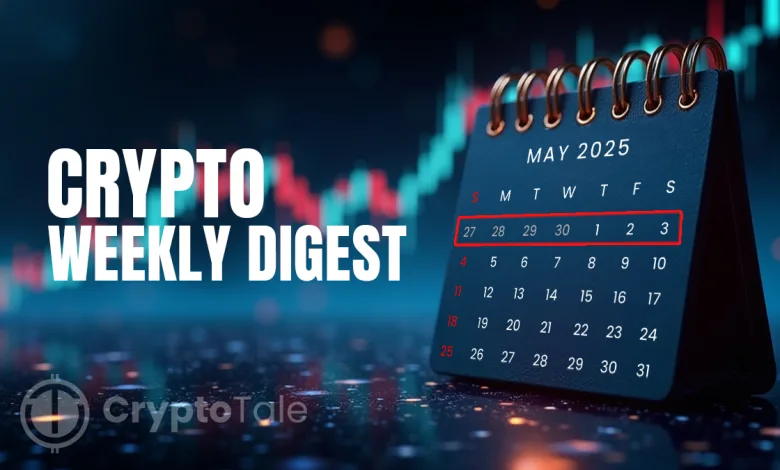Crypto Weekly Digest, May 5: Nike Faces Lawsuit Over NFT Exit

Hey folks! Welcome to the latest edition of the Crypto Weekly Digest. Here’s a quick glimpse of the significant developments that took place in the crypto world over the last week. Nike faced a $5M class-action lawsuit following its abrupt shutdown of the RTFKT NFT platform earlier this year.
Filed in Brooklyn federal court and led by Jagdeep Cheema, the complaint alleged that Nike promoted sneaker-themed NFTs as digital assets to investors, only to discontinue the platform without warning. The lawsuit further claimed that Nike sold these NFTs as unregistered securities in violation of the U.S. securities laws. By leveraging its brand to market the NFTs, Nike is accused of misleading investors, many of whom claim to have suffered financial losses.
Meanwhile, the crypto exchange Bitget initiated legal action against eight trading accounts alleged to have manipulated the VOXEL/USDT perpetual futures market. According to the exchange, these accounts generated over $20 million in profit during a trading surge on April 20, when VOXEL’s price rapidly increased from $0.021 to $0.139 before correcting.
Bitget’s internal investigation identified abnormal trading activity that prompted the temporary suspension of several accounts. Bitget’s head of Chinese operations, Xie Jiayin, confirmed that legal letters were issued swiftly, targeting professional arbitrage groups suspected of coordinated manipulation. Daily volume for VOXEL futures on Bitget reached $12 billion on that date, which was far above the average levels.
Related: Bitcoin Giant Strategy Targets $21B for Fresh Crypto Push
On the institutional side, Abu Dhabi announced the launch of a dirham-backed stablecoin by partnering with sovereign wealth fund ADQ, conglomerate IHC, and First Abu Dhabi Bank. The stablecoin will be issued after approval from the Central Bank of the UAE. It can be used not just by the general public but also by business entities and institutional-level users functioning on the ADI blockchain developed by the ADI Foundation.
Also, Ripple increased its acquisition bid for Circle to $20 billion after its first offer was rejected. Notably, the first offer provided $4-$5 billion. Circle, the issuer of USDC—the second-largest stablecoin by market cap—recently filed for a public offering. The last valuation in 2022 for an unsuccessful listing was anywhere between $8 billion and $9 billion. The renewed offer is a sign that Ripple continues to try to get a stablecoin foothold, considering the strategic market position that Circle occupies.
In a bid to expand access to real-world assets (RWAs), Sony’s blockchain subsidiary Soneium has partnered with Plume, a platform specializing in RWA tokenization. The collaboration integrates Plume’s SkyLink interoperability layer into Soneium’s Ethereum Layer-2 network. This allows Soneium’s 5.1 million users to stake and earn yields from tokenized U.S. Treasuries and private credit instruments without leaving the platform. Plume currently supports over 180 companies and manages over $4 billion in tokenized assets, including offerings from Ondo Finance.
After a long hiatus, the market witnessed Bitcoin gain leverage with the BTC/USDT pair approaching a critical resistance level around $96,000. As of press time, Bitcoin is at $94, 730. According to CryptoQuant data, the Bitcoin Bull Score Index has surged to 60, indicating strong upward momentum. A similar technical setup was seen during the 2021 and early 2025 bull cycles. The breakout at this resistance could confirm the beginning of another phase in the market rally.
On the regulatory side, Kraken successfully busted an infiltration attempt by an alleged North Korean state-sponsored hacker who tried to enter the company as a job-seeker. The candidate set off red flags during the recruitment process, with discrepancies existing between the name, the documents, and the voice verification. In an attempt to observe the working methods of the individual, the company’s recruitment and security departments allowed the interview to proceed. The incident exposed weak points of hiring procedures throughout the digital asset industry and hammered home the need for identity verification schemes.
Related: Trump’s First 100 Days Rock Crypto and Global Markets
Lastly, Apple has altered its App Store policies to comply with a recent U.S. federal court ruling. Developers should add external links for payment methods, including those involving NFTs and cryptocurrencies. The update follows a decision by U.S. District Judge Yvonne Gonzalez Rogers, who concluded that Apple had willfully violated a 2021 antitrust injunction related to the Epic Games case. The ruling criticized Apple for maintaining anti-competitive practices that restricted developer access to alternative payment systems.




